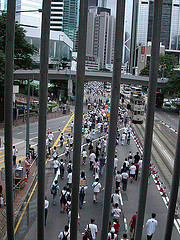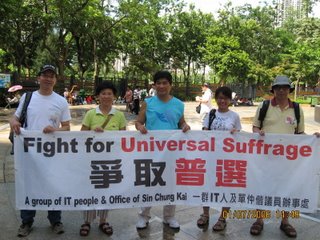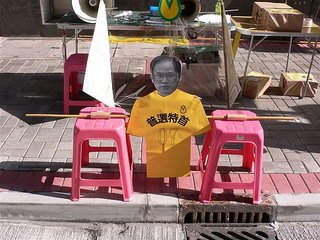July first in China is many things. It is the anniversary of the founding of the Communist Party in China, the day in 1997 when Hong Kong was handed over to China and is also the date of one of the largest mobilizations in Hong Kong each year.
This year the number of demonstrators has doubled compared to last year; the mainstream media explained that it was the effect of Anson Chan stepping out to challenge the SAR government, particularly the reigning Chief Executive Officer Donald Tsang. However, bloggers have their own explanation on why they joined the demonstration or not.

Compared with two to three years ago when 500,000 people would come out for the July first protest, lower numbers over the last two years could be explained by shifting attitudes towards the issues and, as Hong Kong blogger Tungpo explains, the protest organizers themselves.
上年冇去,今年更加唔會去。因為,唔知去嚟做乜。我覺得,民陣愈來愈脫離現實,亦唔識把握時機。
Conflicting with the theory that this year's increased turnout over 2005 could be explained by the attendance of certain high-profile politicians, Civic Express member and blogger Charles Mok says otherwise.

但是今年我還是參加了,並不是因為陳太來了,是因為去年第五號報告書過不了立法會,今年經濟好轉了,政府明顯地希望轉移視線,要拖慢民主步伐,所以,是必需上街的時候了,不過,去了之後,是再一次的失望。

Lamfai feels that people should not focus on the number of protestors and the role of organizer too much as the democratic movement in Hong Kong has to transform into a more mature stage.
零三年的七一遊行,『公民』與『社會』邂逅,一時天雷勾動地火,譜出了最轟烈、最激盪人心的驚世戀曲;然而接下來的日子,在熱戀期過去之後,就要實實在在地學習如何相處、如何相愛、如何由激情澎湃的戀變成細水長流的愛。後七一的日子,民間出現了多個新媒體、論政組織和政治團體,它們豐富了公共空間內的討論,也拉闊了本地的政治光譜,但最困難的仍是打破市民對組織的莫名抗拒。七一遊行只是民主運動和走向公民社會的其中一步,而非唯一一步






